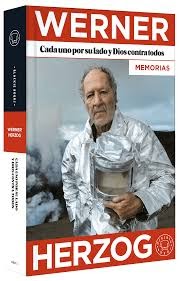
Original title: Every man for himself and God against all – memories
Year of publication: 2022
Translation: Marina Bornas
Valuation: Essential (hala, there you go)
Werner Herzog, that strange and lonely guy, addicted to peculiar stories, is one of the greatest exponents of cinema of the last quarter of the 20th century and his “trilogy” Nosferatu – Aguirre, the wrath of God – Fitzcarraldo forms a kind of Holy Trinity cinematic for me. This is a double-edged sword; Expectations are not always met and one can end up, even if unfairly, somewhat disappointed. Come on, a little what happened to me with Conquest of the useless, shooting diary of Fitzcarraldo.
In the case of Each one on their own and God against everyone expectations have been exceeded, to the point that I can say, even though we are still in the month of April, that this book will appear on my list of “the best of the year 2024.” And, furthermore, I am going to reason it.
Following a generally chronological order, Herzog interweaves life and work in a text that can be read, obviously, as an autobiography, but also as a training novel, adventure novel or travel chronicle.
Anyone interested in his cinema, whether fiction or documentary, will find in these pages some of the keys that will be observed in his work. In this sense, there are two determining phrases: “What we saw as children I still see today” y “There are a series of recurring motifs in my films that are almost always based on real-life experiences.” Childhood and adolescence as keys that condition and explain the future, as a starting point for the first third of the most Bernardian text, with whom the author shares time and space; life as a stage.
Between the anecdotal and the sociopolitical context of the time, his childhood and adolescence at the end of the Second World War, his complex family relationships, his devotion to two of his brothers, his passion for soccer, his school years, his different forms of seeking transcendence (through travel, religion, etc.) make up a formative novel that can be read, perfectly, by someone who does not know the German’s work. Very interesting portrait of a very specific time and place, but therefore deeply universal, it has a high literary value in itself.
As the book progresses and Werner Herzog becomes an adult, the text focuses on cinema. From those self-taught and self-financed beginnings to the latest documentaries, including his operatic adaptations, the author reviews his different projects, failed or not. Always walking a tightrope and always attracted by stories on the edge and extravagant characters, Herzog tells stories from his filming, his relationships with different members of his team (Klaus Kinski (of course), Walter Saxer, etc.) and with characters as extremely interesting like Bruce Chatwin, Mike Tyson (!!!) or Reinhold Messner. It is this aspect of the text that places it closer to the adventure novel and the travel chronicle, as well as film history, of course.
Its final part, however, begins to focus on more confessional and intimate, more reflective or essayistic aspects. The personal and family join their visions of the future and close the circle that begins with an epiphany of youth.
There are three things in particular that I like most about Werner Herzog’s memoirs:
- I have already mentioned it, but the text transcends the merely personal and this seems fundamental to me in books of this type.
- Let there be no “settling of accounts.” With a life of this type and with the multitude of people with whom Herzog has crossed paths, his memoirs could have taken more sensational paths. They don’t do it and it is appreciated.
- Rhythm. Herzog keeps us glued to the pages of the book and handles the narrative tension perfectly. It is surprising, due to the scarcity of cases, that the author handles two languages as different as literary and cinematographic with such ease and solvency.
Anyway. I think that everything above serves to give a general image of what these memories are and the reasons for the evaluation, don’t you think?
Source: https://unlibroaldia.blogspot.com/2024/04/werner-herzog-cada-uno-por-su-lado-y.html


